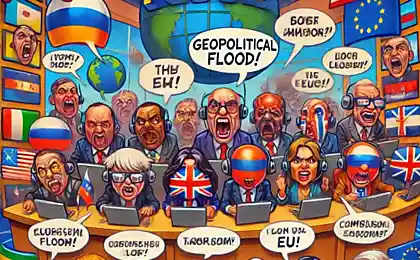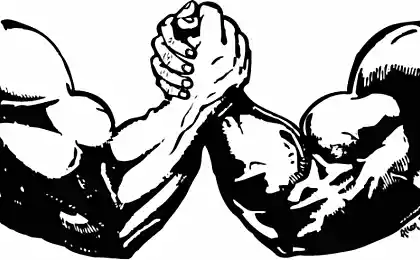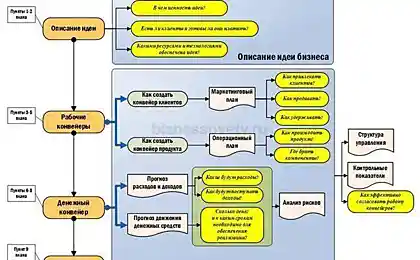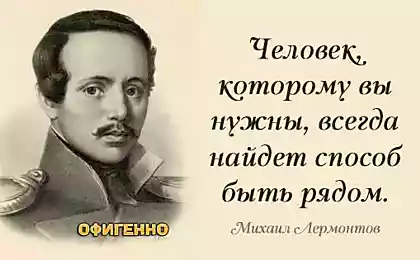170
I re-read Lermontov’s poem “Farewell, Unwashed Russia” again and again, admiring the poetic genius.
“Farewell, unwashed Russia” is a phrase that could be said by those who leave their homeland in search of a better life. But it's just that. poem by Mikhail Lermontov. And very interesting, although it consists of only 2 quatrains.
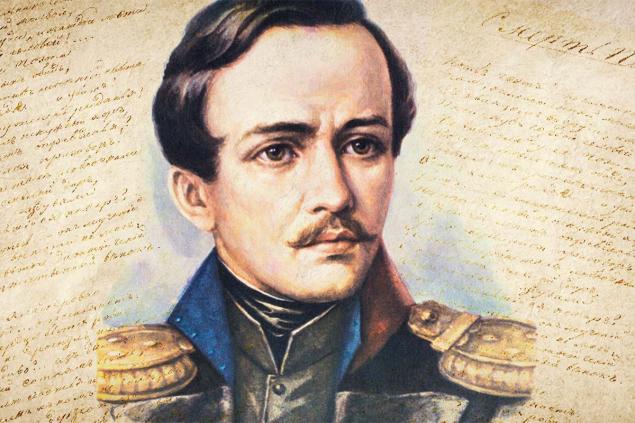
During the 20th century, this poem was very popular. But in our time, it has taken on a new meaning. What is this poem about and what is the meaning of the poet put in 8 loud lines? Editorial "Site" He will answer all the questions later in the article.
It is not known under what circumstances the poem by Mikhail Lermontov was created. However, in literary circles it is believed that the poet wrote this poem while leaving his homeland. Either when he left for exile in the Caucasus in 1840, or when he was obliged to leave Peterbug in 1941.
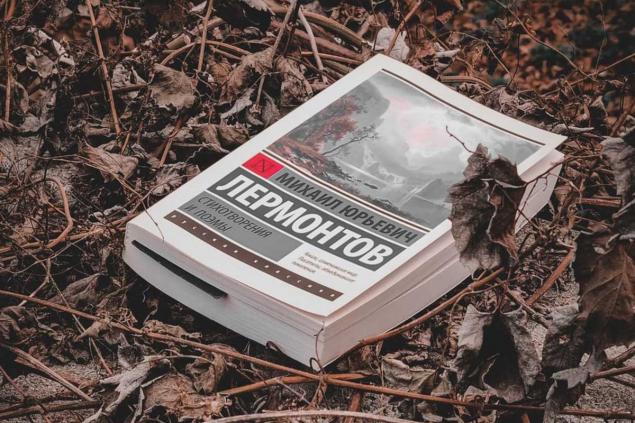
Instagram/@my.musaev Interestingly, this verse was not known while the writer was alive. It was first mentioned in 1873, 32 years after the death of Mikhail Yurievich. It was officially published later in 1987. Moreover, the authorship of Lermontov was not indicated. After 3 years, the poem appeared in another magazine. It was supported by a note: "Recorded from the words of the poet by a contemporary."
The poem itself goes like this:
Goodbye, unwashed Russia,
The land of slaves, the land of masters,
And you blue uniforms,
And you, their loyal people.
Maybe beyond the Caucasus Wall.
I'll hide from your pashas
From their all-seeing eye,
From their hearing ears.
Now let’s move on to the most interesting. Let's analyze the poem together.
Analysis of the poem “Farewell, unwashed Russia” is a reflection of the reality in which Lermontov lived. In just 8 lines, the poet showed how he sees the Russian Empire and why he does not like it. This is a country in which the highest ranks dominate, and ordinary people obey them.

Instagram / @empiresunset Such a state has no future. Here, people in blue uniforms, that is, gendarmes, watch the order. They can hardly be called brave defenders of the homeland and fighters for justice. Instead, they engaged only in oppressive activities: listening, peeping and punishing. The Russian people simply obeyed them.
In his poem, Mikhail Yurievich contrasts Russia with the freedom-loving Caucasus. It is there that the poet hopes to escape from the “all-seeing eye and all-hearing ears.” The Russian Empire. Does that ring a bell?
Why is Lermontov’s poem relevant today? On February 24, 2022, Russia launched a full-scale war against Ukraine. Many Russian stars have spoken out against it. However, the words of media personalities have no influence on power. Disagreeing with the ruling regime of the Russian Federation decided to leave their homeland.
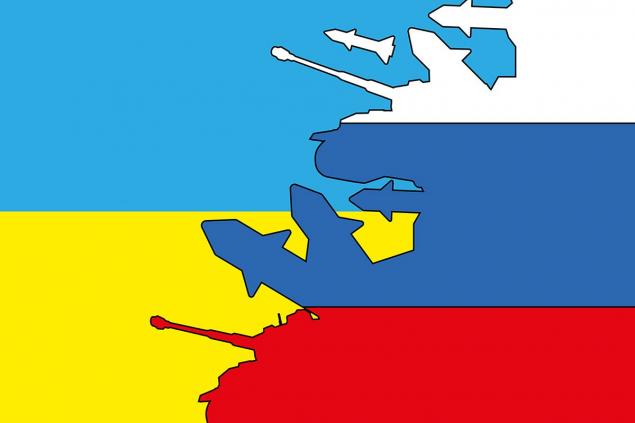
And today the poem of the Russian poet has played with new colors. The Russian mindset did not become collective in a day. This happened as a result of the painstaking work of propagandists who instill false ideas into the minds of ordinary Russians. They say that history is cyclical. It used to be, it happens now.

It is not for nothing that Lermontov calls his countrymen slaves. A quote from the book by Brazilian psychologist-teacher Paulo Freire perfectly describes what is happening. “The oppressed, who have absorbed the image of the oppressor and accepted his principles, fear freedom. Freedom would force them to get rid of this image, replacing it with independence and responsibility. Freedom is not given for nothing, but is won in struggle, the author writes.
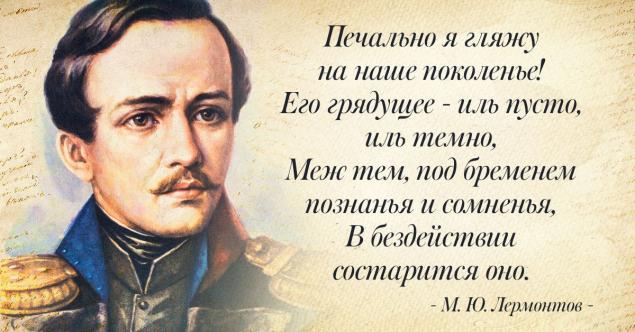
As you know, Mikhail Yurievich died during a duel. Contemporaries of the poet noted that he had a sarcastic character and a sharp tongue. That's what caused the trouble. However, it seems to me that sooner or later there would be another reason to deprive Lermontov of his life. People who are undesirable to the Russian state have never been given the right to live normally, either in the past or in the present.
Let this poem be food for your thoughts. Do you really live in a country that is close to you?

During the 20th century, this poem was very popular. But in our time, it has taken on a new meaning. What is this poem about and what is the meaning of the poet put in 8 loud lines? Editorial "Site" He will answer all the questions later in the article.
It is not known under what circumstances the poem by Mikhail Lermontov was created. However, in literary circles it is believed that the poet wrote this poem while leaving his homeland. Either when he left for exile in the Caucasus in 1840, or when he was obliged to leave Peterbug in 1941.

Instagram/@my.musaev Interestingly, this verse was not known while the writer was alive. It was first mentioned in 1873, 32 years after the death of Mikhail Yurievich. It was officially published later in 1987. Moreover, the authorship of Lermontov was not indicated. After 3 years, the poem appeared in another magazine. It was supported by a note: "Recorded from the words of the poet by a contemporary."
The poem itself goes like this:
Goodbye, unwashed Russia,
The land of slaves, the land of masters,
And you blue uniforms,
And you, their loyal people.
Maybe beyond the Caucasus Wall.
I'll hide from your pashas
From their all-seeing eye,
From their hearing ears.
Now let’s move on to the most interesting. Let's analyze the poem together.
Analysis of the poem “Farewell, unwashed Russia” is a reflection of the reality in which Lermontov lived. In just 8 lines, the poet showed how he sees the Russian Empire and why he does not like it. This is a country in which the highest ranks dominate, and ordinary people obey them.

Instagram / @empiresunset Such a state has no future. Here, people in blue uniforms, that is, gendarmes, watch the order. They can hardly be called brave defenders of the homeland and fighters for justice. Instead, they engaged only in oppressive activities: listening, peeping and punishing. The Russian people simply obeyed them.
In his poem, Mikhail Yurievich contrasts Russia with the freedom-loving Caucasus. It is there that the poet hopes to escape from the “all-seeing eye and all-hearing ears.” The Russian Empire. Does that ring a bell?
Why is Lermontov’s poem relevant today? On February 24, 2022, Russia launched a full-scale war against Ukraine. Many Russian stars have spoken out against it. However, the words of media personalities have no influence on power. Disagreeing with the ruling regime of the Russian Federation decided to leave their homeland.

And today the poem of the Russian poet has played with new colors. The Russian mindset did not become collective in a day. This happened as a result of the painstaking work of propagandists who instill false ideas into the minds of ordinary Russians. They say that history is cyclical. It used to be, it happens now.

It is not for nothing that Lermontov calls his countrymen slaves. A quote from the book by Brazilian psychologist-teacher Paulo Freire perfectly describes what is happening. “The oppressed, who have absorbed the image of the oppressor and accepted his principles, fear freedom. Freedom would force them to get rid of this image, replacing it with independence and responsibility. Freedom is not given for nothing, but is won in struggle, the author writes.

As you know, Mikhail Yurievich died during a duel. Contemporaries of the poet noted that he had a sarcastic character and a sharp tongue. That's what caused the trouble. However, it seems to me that sooner or later there would be another reason to deprive Lermontov of his life. People who are undesirable to the Russian state have never been given the right to live normally, either in the past or in the present.
Let this poem be food for your thoughts. Do you really live in a country that is close to you?
As soon as young zucchini with a thin skin appear on the market, I make such a snack with garlic, guests cannot be torn off.
If I meet a jar of old jam in the kitchen, I immediately breed gelatin and serve a festive dessert for dinner.

